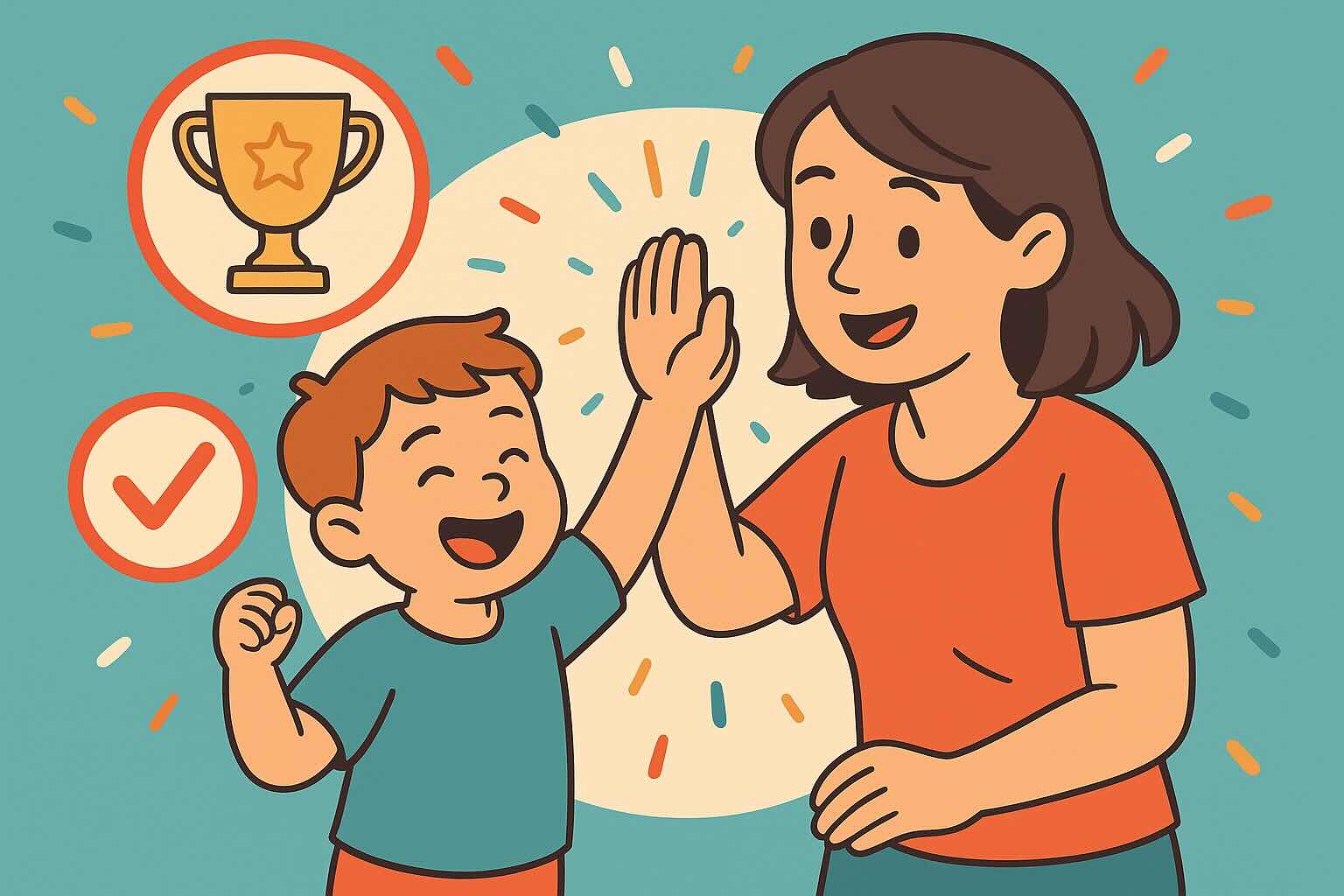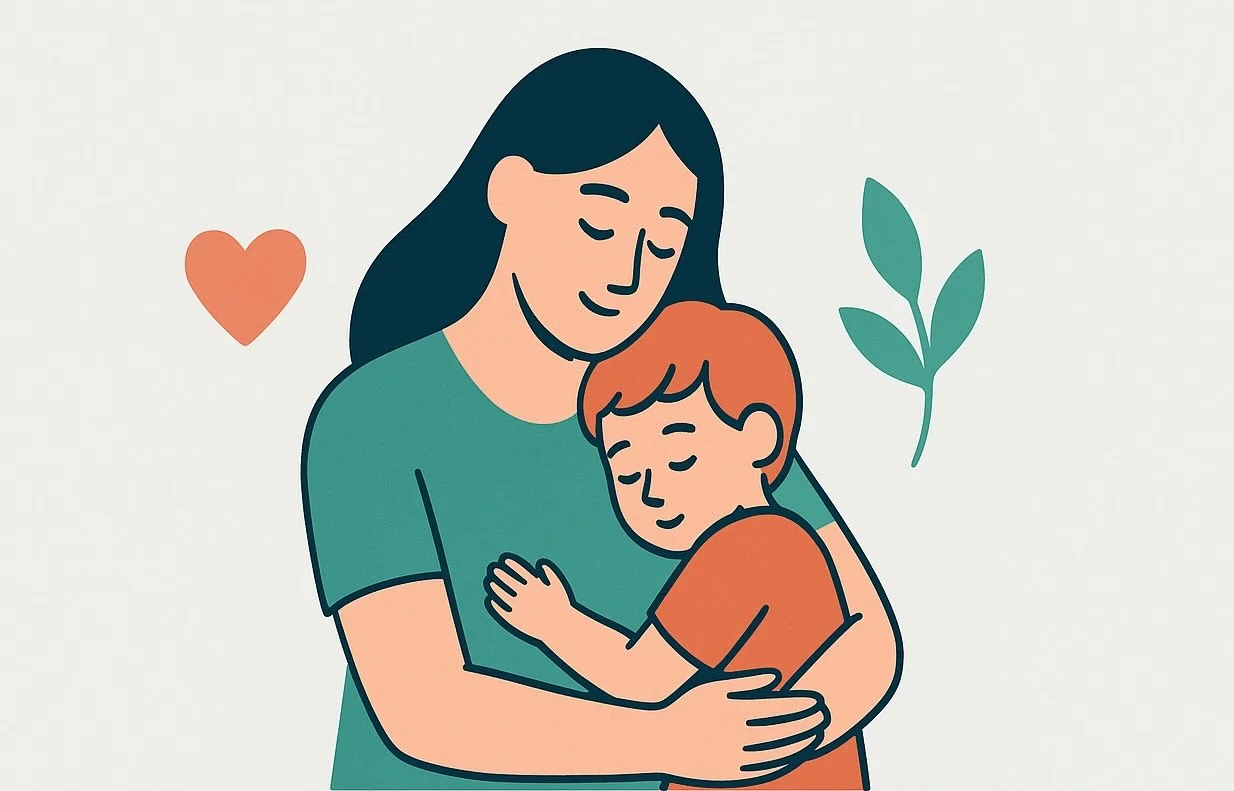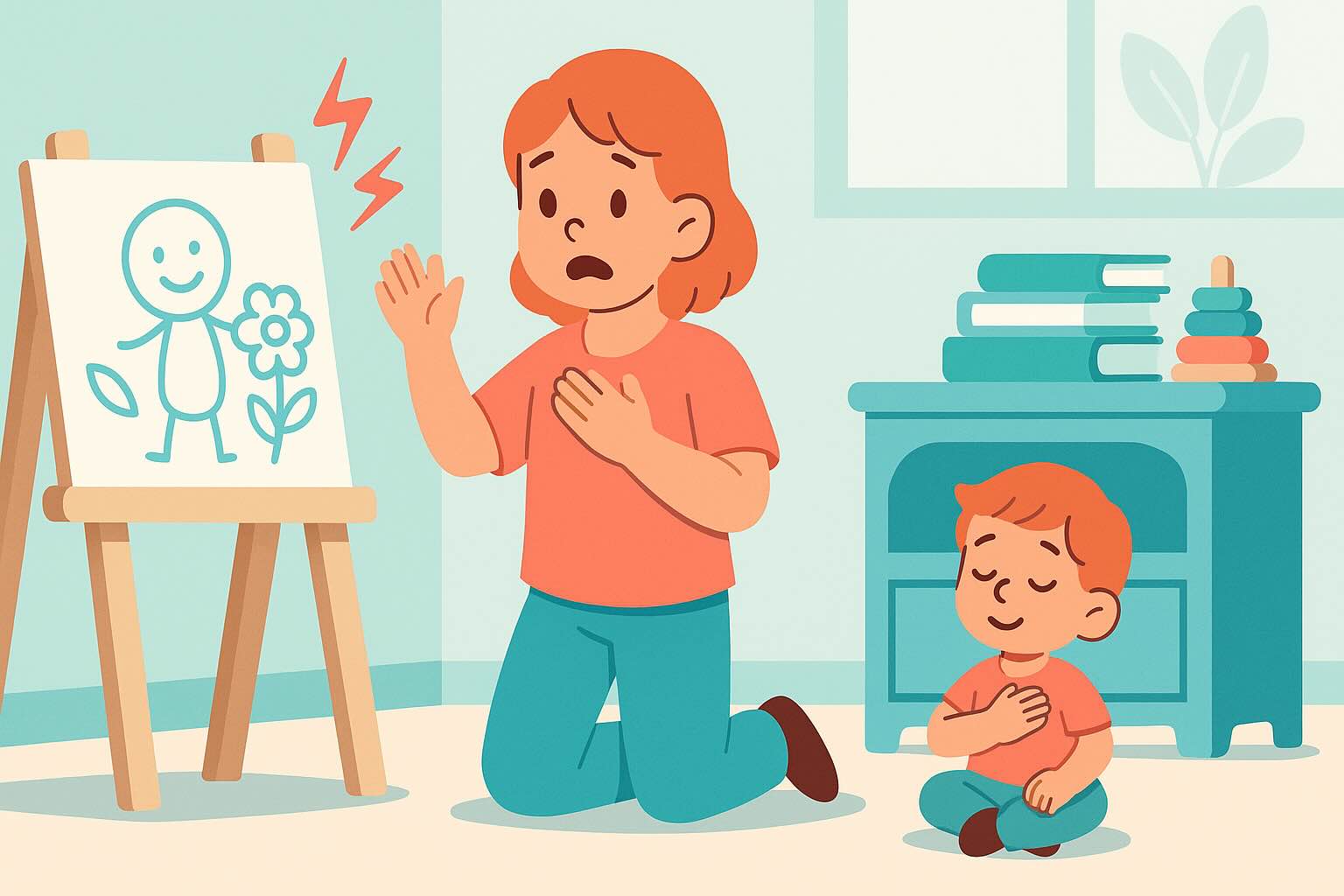Progress Not Perfection: Why Celebrating Small Wins Changes Everything


Your 5-year-old has been working on not interrupting during conversations. For weeks, they've been cutting in constantly, and you've been gently reminding them to wait. Today, they interrupted twice instead of their usual six times, and even caught themselves once and said "Oops, sorry!" Your first thought might be "They're still interrupting - this isn't working." But what if this perspective is actually undermining your child's confidence and your own effectiveness as a parent?
Progress not perfection is the mindset that celebrates incremental improvements and recognizes that all meaningful development happens gradually over time. Instead of waiting for flawless behavior, this approach acknowledges every step forward, building your child's confidence and motivation to continue growing.
This comprehensive guide will transform how you view and respond to your child's development, helping you become their biggest champion while maintaining realistic expectations about the learning process. For foundational approaches that support this mindset, explore our connection before correction guide and emotional safety first strategies.
What You'll Learn in This Guide
- Why Perfection Pressure Backfires - How expecting immediate mastery actually slows development
- The Science of Incremental Growth - How children's brains actually develop new skills
- Recognizing Real Progress - What to look for and celebrate in daily life
- Age-Specific Progress Markers - Normal development timelines for 3-7 year olds
- Celebrating Without Creating Praise Dependency - How to acknowledge growth authentically
- Handling Setbacks and Regression - Why backward steps are part of moving forward
- Building Growth Mindset - Teaching your child to value effort over outcome
- Creating a Progress-Focused Family Culture - Making improvement a family value
Estimated reading time: 12 minutes
Why Perfectionist Parenting Backfires
The Hidden Costs of Perfection Pressure
When we expect immediate mastery:
- Children become afraid to try new things (fear of failure)
- They develop anxiety about making mistakes
- They give up quickly when things are difficult
- They become either perfectionists or learn to avoid challenges
- Their natural love of learning gets replaced by performance anxiety
Research findings:
- Children with perfectionist parents show higher rates of anxiety and depression
- Praise for perfection reduces intrinsic motivation over time
- Kids who fear making mistakes take fewer creative risks
- Perfectionist pressure actually slows skill acquisition
- Children perform better when they feel safe to make mistakes
The All-or-Nothing Trap
Common perfectionist thinking patterns:
- "They're still having tantrums, so nothing is working"
- "If they really understood, they wouldn't forget"
- "Other kids their age don't act this way"
- "They should be able to do this by now"
- "Either they can do it or they can't"
The reality of child development:
- Skills develop gradually over months and years
- Forgetting and remembering are part of the learning process
- Every child develops at their own pace
- Regression is normal and doesn't indicate failure
- Most behaviors improve slowly, with many ups and downs
The Science of How Children Actually Learn
Neuroplasticity and Skill Development
How the brain builds new pathways:
- Repetition strengthens neural connections gradually
- Each attempt (even unsuccessful ones) builds brain architecture
- Skills become automatic only after hundreds of repetitions
- Stress hormones interfere with learning and memory
- Positive emotions enhance neural pathway development
The learning process timeline:
- Week 1-2: Introduction and initial attempts
- Week 3-6: Inconsistent application with many mistakes
- Week 7-12: More consistent use but still requires reminders
- Month 4-6: Becoming more automatic but not perfect
- 6+ months: Skill becomes well-established and natural
Why Mistakes Are Essential
Mistakes serve important functions:
- They provide feedback about what doesn't work
- They strengthen neural pathways through correction
- They build resilience and problem-solving skills
- They teach children that learning involves trial and error
- They create opportunities for growth and improvement
When we treat mistakes as failures:
- Children become mistake-avoidant
- Learning slows down significantly
- Anxiety around performance increases
- Natural curiosity and exploration decrease
- Children lose confidence in their ability to learn
Recognizing and Celebrating Real Progress
What Progress Actually Looks Like
Progress indicators to watch for:
Behavioral improvements:
- Fewer instances of challenging behavior (even if not zero)
- Shorter duration of difficult episodes
- Quicker recovery after upsets
- Attempting new strategies, even imperfectly
- Self-correction when they notice mistakes
Emotional development:
- Using feeling words more often
- Seeking comfort when upset
- Showing empathy for others
- Managing disappointment slightly better
- Expressing needs with words instead of behavior
Social growth:
- Sharing occasionally instead of never
- Playing cooperatively for longer periods
- Apologizing after conflicts (even if prompted)
- Including others in play sometimes
- Following group rules more consistently
Progress vs. Perfection Examples
Sharing toys:
- Perfection expectation: Always shares willingly without conflict
- Progress reality: Shares 2 out of 5 times asked, cries but gives up toy, shares with prompting
Following instructions:
- Perfection expectation: Listens and obeys immediately every time
- Progress reality: Follows through after second reminder, does task but complains, remembers sometimes without reminder
Emotional regulation:
- Perfection expectation: Never has tantrums or meltdowns
- Progress reality: Tantrums last 5 minutes instead of 20, accepts comfort afterward, uses words before hitting
Age-Specific Progress Timelines
Ages 3-4: Foundation Building
Normal development timeline:
- New skills: 2-4 months to show consistent progress
- Emotional regulation: 4-6 months for noticeable improvement
- Social skills: 6-12 months for reliable cooperation
- Following rules: 3-6 months for internalization
What progress looks like:
- Remembering rules sometimes instead of never
- Using words occasionally when upset
- Playing near others before playing with others
- Following one-step instructions more consistently
- Showing empathy through facial expressions or actions
Example progress markers: Teaching "gentle touches"
- Week 1-2: Still hitting but stops when reminded
- Week 3-4: Catches themselves mid-hit sometimes
- Week 5-8: Touches gently when reminded, hits less often
- Week 9-12: Gentle touches becoming more natural, occasional reminders needed
Ages 5-7: Skill Refinement
Normal development timeline:
- Complex behaviors: 3-6 months for consistent improvement
- Social problem-solving: 6-12 months for independent application
- Academic skills: 4-8 months depending on complexity
- Emotional awareness: 2-4 months for basic recognition
What progress looks like:
- Applying skills in new situations
- Self-correcting mistakes independently
- Teaching others what they've learned
- Explaining their thinking process
- Generalizing skills across different contexts
Example progress markers: Learning to handle disappointment
- Month 1: Still melts down but recovers faster
- Month 2: Uses some coping strategies with prompting
- Month 3: Tries strategies independently, mixed success
- Month 4-6: Generally handles minor disappointments well, struggles with big ones
Celebrating Progress Without Creating Praise Dependency
Effective Progress Recognition
Focus on specific observations:
- "I noticed you used words when you felt angry"
- "You kept trying even when the puzzle was hard"
- "You shared your snack with your sister"
- "You remembered to hang up your backpack"
Highlight effort and process:
- "You worked really hard on that"
- "You tried a different way when the first way didn't work"
- "You didn't give up even though it was frustrating"
- "You asked for help when you needed it"
Ask reflective questions:
- "How did that feel when you solved it?"
- "What do you think helped you remember?"
- "What was the hardest part about that?"
- "What are you most proud of?"
What NOT to Say
Avoid generic praise:
- "Good job!" (too vague)
- "You're so smart!" (focuses on ability, not effort)
- "Perfect!" (sets unrealistic standards)
- "I'm proud of you!" (makes it about your feelings)
Avoid comparison:
- "You're better than other kids"
- "Why can't you always do this well?"
- "See? You can do it when you try"
- "Finally! You got it right"
Handling Setbacks and Regression
Why Regression Happens
Common causes of temporary setbacks:
- Stress or major life changes
- Illness or disrupted sleep
- Developmental leaps (energy goes to new skills)
- Emotional overwhelm
- Changes in routine or environment
Normal regression patterns:
- Skills seem to disappear temporarily
- Previously mastered behaviors return
- Emotional regulation becomes more difficult
- Academic performance may temporarily decline
- Social skills may regress under stress
Responding to Setbacks
Helpful mindset shifts:
- "This is temporary, not permanent"
- "Their brain is working on something new"
- "The skill is still there, just not accessible right now"
- "This is information, not failure"
Practical responses:
- Return to earlier levels of support
- Reduce expectations temporarily
- Focus on emotional connection
- Look for what's causing the stress
- Maintain consistency without pressure
What to say to your child:
- "Sometimes we need extra help with things we know how to do"
- "Your brain is working on growing, and that's hard work"
- "It's okay to need reminders again"
- "Everyone has times when things feel harder"
Building Growth Mindset in Your Child
Teaching the Learning Process
Help your child understand:
- Brains grow stronger with practice
- Mistakes help us learn
- "Not yet" is better than "I can't"
- Effort matters more than perfect results
- Everyone learns at their own pace
Growth mindset language:
- "You haven't learned this yet"
- "Your brain is working hard to figure this out"
- "Mistakes help your brain grow"
- "What could you try differently next time?"
- "I can see you're getting better at this"
Modeling Growth Mindset
Show your own learning process:
- "I'm still learning how to cook this recipe"
- "I made a mistake and learned something new"
- "This is challenging for me, and I'm going to keep practicing"
- "I don't know how to do this yet, but I can learn"
Share your progress stories:
- "When I was learning to drive, I had to practice for months"
- "Reading wasn't easy for me at first either"
- "I'm still getting better at being patient when I'm frustrated"
Creating a Progress-Focused Family Culture
Daily Progress Recognition
Make progress visible:
- Point out improvements as they happen
- Keep a family progress journal or photo album
- Create simple charts that show growth over time
- Take before-and-after photos of projects or skills
Weekly progress celebrations:
- Family dinner sharing of weekly improvements
- "Progress parties" for significant milestones
- Creating art projects about growth and learning
- Reading books about characters who overcome challenges
Family Progress Values
Establish family principles:
- "In our family, we celebrate trying"
- "Mistakes are how we learn"
- "Everyone grows at their own pace"
- "Progress matters more than perfection"
- "We support each other's growth"
Create family traditions:
- Monthly progress photo sessions
- Annual letters to each child about their growth
- Family challenge activities that require multiple attempts
- Sharing stories about famous people who failed before succeeding
Your 4-Week Progress Mindset Development Plan
Week 1: Awareness and Observation
- Notice when you expect perfection vs. appreciate progress
- Start tracking one behavior or skill your child is working on
- Practice pointing out small improvements you see
- Begin using "yet" language with your child
Week 2: Celebration and Recognition
- Implement daily progress observations
- Focus on effort and process rather than outcomes
- Start a simple progress tracking system
- Practice specific, descriptive feedback
Week 3: Growth Mindset Building
- Teach your child about how brains grow with practice
- Share your own learning experiences and mistakes
- Use setbacks as learning opportunities
- Focus on problem-solving rather than avoiding challenges
Week 4: Family Culture Integration
- Establish regular progress celebration rituals
- Create family values around growth and learning
- Plan activities that require multiple attempts to master
- Evaluate and adjust your progress recognition practices
Signs Your Progress Mindset is Working
Immediate Signs (1-2 weeks)
- You feel less frustrated with your child's imperfect attempts
- Your child seems more willing to try challenging things
- You notice improvements you previously overlooked
- Family atmosphere feels more positive and encouraging
Medium-term Signs (3-4 weeks)
- Your child begins recognizing their own progress
- They recover more quickly from mistakes or failures
- You see sustained effort on difficult tasks
- Your child starts using growth mindset language
Long-term Signs (2-3 months)
- Your child shows increased resilience and persistence
- They seek out challenges rather than avoiding them
- Family focus shifts from perfection to improvement
- Your child develops internal motivation for growth
Real-Life Progress Recognition Examples
Academic Skills
Reading progress:
- Week 1: Recognizes some letters, needs help with most words
- Week 4: Sounds out simple words, remembers some sight words
- Week 8: Reads simple sentences with occasional help
- Celebrate: "You're remembering more words each day!"
Social Skills
Friendship development:
- Month 1: Plays parallel to others, minimal interaction
- Month 2: Joins group activities when invited
- Month 3: Initiates play with others sometimes
- Celebrate: "I noticed you asked Emma to play with you today!"
Emotional Regulation
Anger management:
- Week 1: Hits when angry, difficult to calm down
- Week 3: Uses words sometimes, still hits occasionally
- Week 6: Tells adults when angry, rarely hits
- Celebrate: "You used your words to tell me you were mad!"
Key Takeaways: Your Progress Not Perfection Guide
- ✅ All meaningful development happens gradually - expect slow, steady improvement over months
- ✅ Celebrate small wins consistently - incremental progress deserves recognition
- ✅ Mistakes are part of learning - avoid treating errors as failures
- ✅ Every child develops at their own pace - compare your child to themselves, not others
- ✅ Regression is normal and temporary - setbacks don't erase previous progress
- ✅ Focus on effort over outcome - acknowledge trying, practicing, and persistence
- ✅ Use "yet" language - "You haven't learned this yet" instead of "You can't do this"
- ✅ Track progress over time - keep records to see growth patterns
- ✅ Model growth mindset yourself - show your own learning process
- ✅ Create a progress-celebrating family culture - make improvement a shared value
Remember: Your child is not a project to be perfected - they're a growing human being learning to navigate the world. When you celebrate their progress instead of waiting for perfection, you give them the confidence to keep growing, the resilience to handle setbacks, and the internal motivation to continue learning throughout their life. Progress not perfection isn't about lowering your standards - it's about understanding how humans actually develop and change.
This article is based on growth mindset research, child development psychology, and neuroscience studies on learning and motivation. Every child's developmental timeline is unique, and building a progress mindset takes patience and practice. Focus on celebrating the journey rather than rushing to the destination.
24/7 AI Parenting Assistant
Get instant, personalized advice with expert-curated parenting knowledge. Chat with your AI coach anytime, anywhere.

Connection Before Correction Toolkit
Daily practices and scripts to build strong parent-child relationships that make behavior guidance more effective.
Frequently Asked Questions
Need personalized support?
RootWise's AI coach can provide tailored strategies for your specific situation, available 24/7 when you need it most.
Learn More About AI Coaching →



